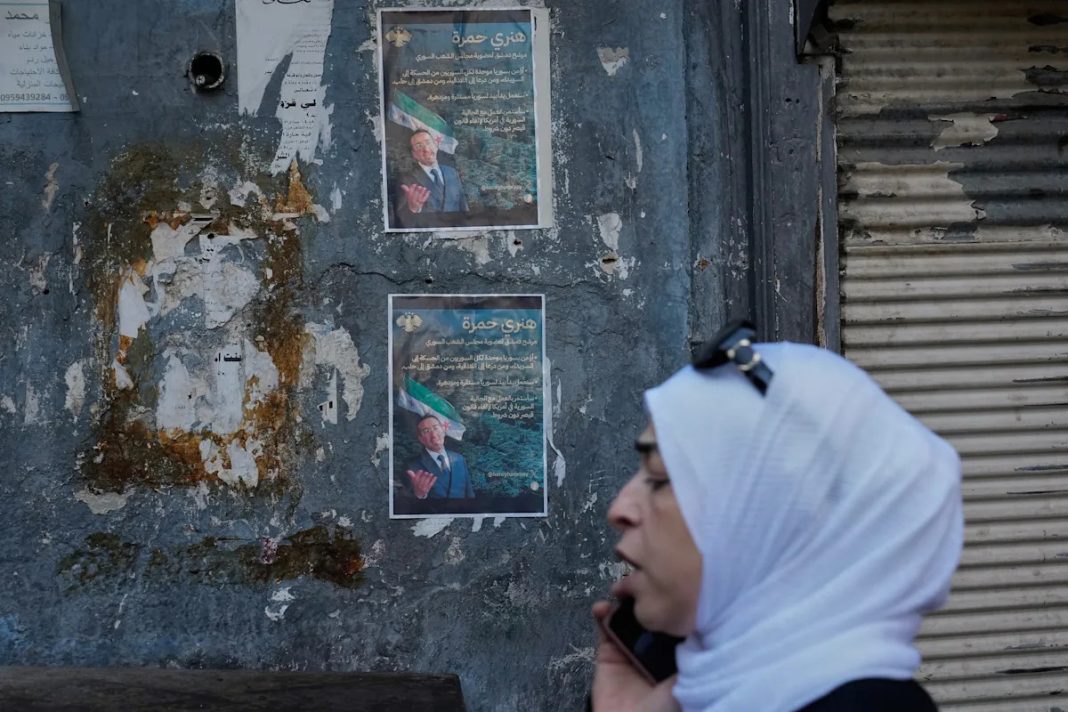DAMASCUS, Syria (AP) — The streets of Damascus barely showed sign Saturday a parliamentary election was set to take place the next day.
There were no candidate posters on the main streets and squares, no rallies, or public debates. In the days leading up to the polling, some residents of the Syrian capital had no idea a vote was hours away, the first since Islamic insurgents ousted former President Bashar Assad in a lightning offensive in December.
“I didn’t know — now by chance I found out that there are elections of the People’s Assembly,” said Elias al-Qudsi, a shopkeeper in Damascus’ old city, after being asked for his views about the upcoming election. “But I don’t know if we are supposed to vote or who is voting.”
His neighborhood, known as the Jewish Quarter, although nearly all of its former Jewish residents have left, is one of the few that has a smattering of campaign fliers posted on walls in its narrow streets.
The posters announce the candidacy of Henry Hamra, a Jewish former resident of the neighborhood who emigrated to the United States with his family when he was a teenager and returned to visit Damascus for the first time after Assad’s fall. Hamra’s campaign announcement made a splash on social media but failed to make an impression on al-Qudsi.
‘Not perfect’ but ‘realistic’
Under Assad’s autocratic rule, al-Qudsi said he never voted. The outcome was a given: Assad would be president and his Ba’ath party would dominate the parliament.
The shopkeeper won’t vote on Sunday either, but for a different reason — there will be no popular vote. Instead, two-thirds of the People’s Assembly seats will be voted on by electoral colleges in each district, while one-third of the seats will be directly appointed by interim President Ahmad al-Sharaa.
“The usual process is, of course, parliamentary elections through the direct vote of citizens, but this ideal is almost impossible now for several reasons,” Nawar Nejmeh, spokesperson for the committee overseeing the elections, told The Associated Press. Chief among them is the fact that large numbers of Syrians were displaced or lost their personal documentation during the country’s civil war, he said.
The interim authorities dissolved the former parliament and political parties after Assad’s fall. To end the “legislative vacuum,” Nejmeh said, the government settled on the current process.
“It is not perfect, but it is the most realistic at the current stage,” he said.
Concerns about credibility
Some Syrian activists who opposed Assad have lambasted the new authorities and the political transition process.
Among them is Mutasem Syoufi, executive director of The Day After, an organization working to support a democratic transition in Syria that trained electoral college members in two cities, at the government’s request, on the provisional elections law and their role in the process.
Syoufi said the elections commission turned down his organization’s proposal to provide independent observers on polling day. Nejmeh, the election committee spokesperson, said lawyers from the Syrian bar association will monitor the vote instead.
The process has also suffered other issues, Syoufi said, including a compressed timeline that gave only a few days for candidates to present their platforms and unexplained last-minute changes in the rosters of electoral college members.
Nejmeh said that in some cases, electors had been “dropped because they have been challenged as a result of their support for the former regime” or because they did not complete the required documentation. But in other cases, “there are people whose names were removed despite their patriotic affiliation and competence” to include more women and religious minorities.
Earlier this year, a national dialogue conference to help Syrians chart their political future was heavily criticized as hastily convened and not truly inclusive. In addition, outbreaks of sectarian violence have left religious minorities increasingly skeptical of the new leadership.
“Are we going through a credible transition, an inclusive transition that represents all of Syria?” Syoufi said. “I think we’re not there, and I think we have to take serious and brave steps to correct all the mistakes that we’ve committed over the last nine months” since Assad’s fall.
Waiting for the final result
Many Syrians are taking a wait-and-see attitude toward the election process — if they are following it at all.
Al Qudsi said he is not much bothered about not having a vote this time.
“We have no problem with how (the parliament members) are elected,” he said. “What is important is that they work for the people and the country.”
On the next street over, his neighbor, Shadi Shams, said he had heard there was an election but was fuzzy on the details. Like many Syrians, the father of six is more preoccupied with day-to-day concerns like the country’s moribund economy, lengthy daily electricity cuts, and struggling education system.
In Assad’s day, he would vote, but it felt performative.
“Everyone knew that whoever was sitting in the People’s Assembly didn’t really have a say about anything,” Shams said.
As for the new system, he said: “We can’t judge until after the elections, when we see the results and the final shape of things.”

